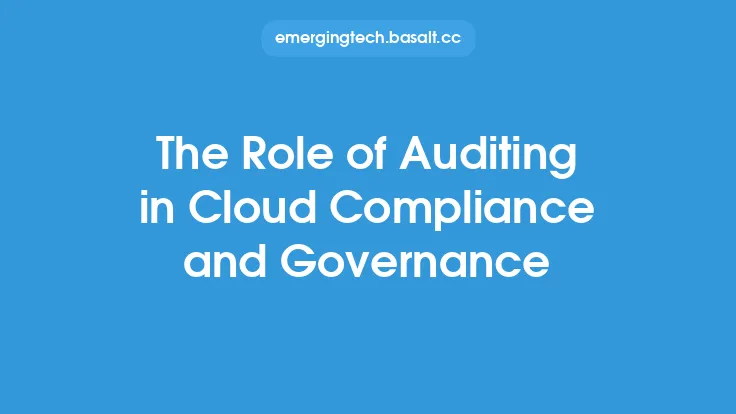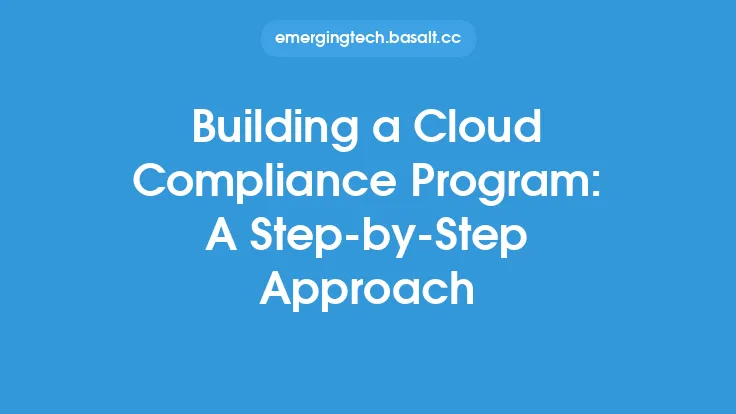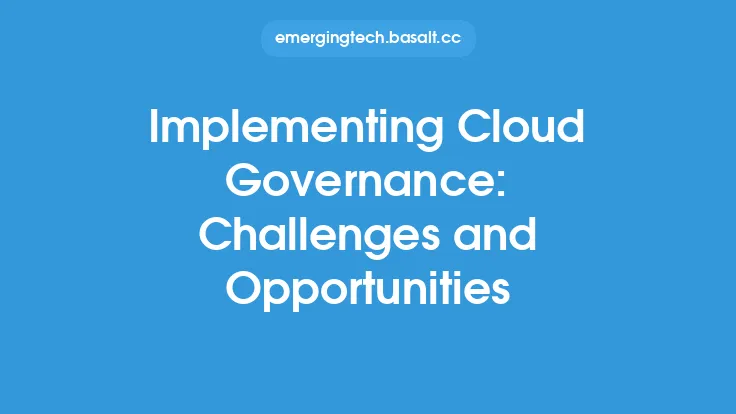The cloud computing industry has experienced rapid growth in recent years, with more organizations moving their data and applications to cloud-based infrastructure. As a result, the need for effective cloud compliance and governance has become increasingly important. Cloud compliance refers to the process of ensuring that an organization's cloud-based infrastructure and applications meet relevant regulatory requirements and industry standards. Governance, on the other hand, refers to the overall management and oversight of an organization's cloud computing environment. In this article, we will review the industry standards and certifications that are relevant to cloud compliance and governance.
Introduction to Cloud Compliance Standards
Cloud compliance standards are guidelines that outline the requirements for ensuring the security, integrity, and availability of cloud-based data and applications. These standards are typically developed by industry organizations, government agencies, or other reputable bodies. Some of the most widely recognized cloud compliance standards include the Payment Card Industry Data Security Standard (PCI DSS), the Health Insurance Portability and Accountability Act (HIPAA), and the General Data Protection Regulation (GDPR). These standards provide a framework for organizations to follow when implementing cloud-based infrastructure and applications, and they help to ensure that sensitive data is protected and handled in accordance with relevant regulations.
Industry Certifications for Cloud Compliance
In addition to compliance standards, there are also several industry certifications that are relevant to cloud compliance and governance. These certifications provide a way for organizations to demonstrate their commitment to cloud compliance and governance, and they can help to build trust with customers and other stakeholders. Some of the most widely recognized industry certifications for cloud compliance include the ISO 27001 certification, the SOC 2 certification, and the FedRAMP certification. The ISO 27001 certification is an international standard that outlines the requirements for an information security management system (ISMS). The SOC 2 certification is a report that evaluates an organization's controls related to security, availability, processing integrity, confidentiality, and privacy. The FedRAMP certification is a US government program that provides a standardized approach to security assessment, authorization, and continuous monitoring for cloud products and services.
Cloud Governance Frameworks
A cloud governance framework is a structured approach to managing and overseeing an organization's cloud computing environment. These frameworks provide a set of policies, procedures, and standards that help to ensure that cloud-based infrastructure and applications are aligned with organizational goals and objectives. Some of the most widely recognized cloud governance frameworks include the Cloud Security Alliance (CSA) Cloud Controls Matrix, the National Institute of Standards and Technology (NIST) Cloud Computing Reference Architecture, and the ITIL (Information Technology Infrastructure Library) framework. The CSA Cloud Controls Matrix is a framework that provides a set of security controls that can be used to assess and improve the security of cloud-based infrastructure and applications. The NIST Cloud Computing Reference Architecture is a framework that provides a comprehensive approach to cloud computing, including security, privacy, and governance. The ITIL framework is a widely recognized approach to IT service management that can be applied to cloud computing environments.
Cloud Compliance and Governance Tools
There are several cloud compliance and governance tools that can help organizations to implement and manage their cloud computing environments. These tools provide a range of features and functionalities, including security monitoring, compliance reporting, and governance management. Some of the most widely recognized cloud compliance and governance tools include cloud security gateways, cloud access security brokers, and cloud management platforms. Cloud security gateways provide a secure entry point to cloud-based infrastructure and applications, and they can help to protect against cyber threats and data breaches. Cloud access security brokers provide a centralized approach to managing access to cloud-based infrastructure and applications, and they can help to ensure that only authorized users have access to sensitive data. Cloud management platforms provide a comprehensive approach to managing cloud-based infrastructure and applications, and they can help to ensure that cloud computing environments are aligned with organizational goals and objectives.
Best Practices for Cloud Compliance and Governance
There are several best practices that organizations can follow to ensure effective cloud compliance and governance. These best practices include implementing a cloud governance framework, conducting regular security assessments and risk analyses, and providing training and awareness programs for employees and other stakeholders. Organizations should also ensure that their cloud computing environments are aligned with relevant regulatory requirements and industry standards, and they should implement controls and procedures to protect sensitive data and prevent cyber threats. Additionally, organizations should regularly review and update their cloud compliance and governance policies and procedures to ensure that they remain effective and relevant.
Conclusion
In conclusion, cloud compliance and governance are critical components of any organization's cloud computing strategy. By understanding the industry standards and certifications that are relevant to cloud compliance and governance, organizations can ensure that their cloud-based infrastructure and applications meet relevant regulatory requirements and industry standards. By implementing a cloud governance framework, using cloud compliance and governance tools, and following best practices, organizations can help to ensure the security, integrity, and availability of their cloud-based data and applications. As the cloud computing industry continues to evolve, it is likely that cloud compliance and governance will become even more important, and organizations that prioritize these areas will be better positioned to succeed in the cloud computing market.





